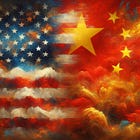Roundup: America's State-run Capitalism Experiment
An overview of the H20 chip drama and the fallout for free markets. Plus, reproductive rights, ID verification laws, and Section 230 news.
The China-U.S. chip-war saga is easy to ignore. There is too much back and forth, flip-flopping, in-the-weeds technical specifications, and frankly, it feels like Xi and Trump are just moving pawn pieces around the chessboard with no intention of touching their Queen, much less a rook.
But it is an important issue. What is happening is the executive branch of the U.S. government is exercising control over individual companies in a way I believe is unprecedented, at least post-WWII. I’ll try to give as brief a background of the H20 chip wars as I can and then explain what these policies mean for the future of technology regulation, national security, and American capitalism.
What exactly is happening?
Here is an excerpt from a ChinaTalk podcast with Jordan Schneider, Lennart Heim, and an old professor of mine, Chris Miller. The whole podcast is worth a listen/read.
Jordan Schneider: Lennart, what is the H20? Why should people care about it? What were the first few months of the Trump administration doing when it came to this chip?
Lennart Heim: The H20 is a chip that NVIDIA designed as a response to export controls in 2023. It’s the typical game: you draw some lines, and then new chips get created right below those lines. The H20 is exactly such an example, but it did a neat trick.
It maxed out the specifications that are not controlled — memory bandwidth. They put the best high-bandwidth memory the world currently has on this chip and created an export control-compliant chip that was introduced at the beginning of 2024, a couple of months after the updated controls. The chip was sold throughout 2024 with lots of interest.
When the Trump administration started in January, the Biden administration didn’t get around to addressing this problem. Many officials spoke out in favor of taking action, but they never got to banning it because of many stakeholders, different opinions, and running out of time.
Trump then banned this chip, as reported in April 2025. Not through the normal regulatory process, but by using a tool called “is-informed” letters, which are pretty fast. You can send a letter to the companies that produce these chips telling them they can’t sell these chips anymore because you suspect an export control violation is going on. The administration argued this chip was simply too good.
So, after the April 2025 ban, what happened? Well, in July 2025, President Trump then decided the chips could be sold to China with a 15% “export tax”, but,
“Beijing appeared to hesitate. Trump’s reversal looked like a straightforward win for China. Yet Beijing ordered its regulators to investigate whether Nvidia’s chips have “loopholes and back doors”. Now that Nvidia has agreed to pay 15 per cent of its Chinese H20 chip sale revenues to the US government, it can restart sales — but first it must convince Beijing that its chips do not pose a security risk.” (FT Gift Article, FT Subscribers)
Are these chips a national security problem?
What are the pros and cons of the ban? What are the national security implications for both countries? Again, from ChinaTalk:
Lennart Heim: From my personal point of view, banning the chip was a big success. This chip should not be sold. We need to reduce our thresholds — this is simply too good of a chip. […]
There are arguments against selling AI chips because selling helps upgrade the Chinese AI ecosystem that’s going to compete with America’s. There are specific applications of the chips that we would be selling to China that we would be very uncomfortable with — military ones, intelligence ones, or broad human rights violations that you wouldn’t want American technology to be helping to further.
There are also arguments in favor of selling. These include the idea that selling NVIDIA chips would retard domestic chip development, making it harder for SMIC and Huawei, and whoever else wants to try to build domestic AI chips to find a marketplace. There’s also the idea that selling chips into China would maintain Chinese dependency on the US stack, keeping Chinese developers using CUDA, building infrastructure around US technology. There’s some broad soft power and agenda-setting advantage that China's use of NVIDIA hardware will give to the US going forward.
Chris Miller: …The question is, how best do you get [to lead in AI]? One argument is that you restrict compute access and thereby hobble the growth of Chinese AI firms. A second argument is that you try to, as Secretary Lutnick has said, get China addicted to the AI stack. The question to ask is: how addicted are they willing to become? How addicted could you make them? Can you leverage that addiction in the future, or not? These are where the empirical questions are focused.
America isn’t the only player in this game; China gets a vote, too. “China’s been racing toward self-sufficiency,” […] “This is a strategic goal of the Chinese Communist Party that has persisted now across four different US presidencies.” (Bloomberg)
Can you actually stop the export?
Controlling the export of goods is difficult. The process basically works like this: If a company wants to export a controlled product (not military related), it probably falls under the jurisdiction of the Commerce Department’s Bureau of Industry & Security (BIS). A company would apply for a license, seek permission, and either receive it or not. If a company fails to obtain the requisite permission, the BIS has sleuths looking for clues that a company is exporting without permission, and there are civil and criminal penalties.
Enforcement is a difficult job, especially when companies either lie about or are unaware of the end user. This is why the U.S. is embedding trackers in shipments. It may seem like an old-school method, but a lot of what BIS is old-school detective work.
Shifting sands of U.S. capitalism?
The United States, particularly the executive branch, is increasingly controlling companies through threats made by the President and by owning actual stakes as an investor.
Recent examples include President Trump’s demand that Intel’s chief executive resign; the 15% of certain chip sales to China that Nvidia and Advanced Micro Devices will share with Washington; the “golden share” Washington will get in U.S. Steel as a condition of Nippon Steel’s takeover; and the $1.5 trillion of promised investment from trading partners Trump plans to personally direct. (WSJ) [The Pentagon is also taking a stake in a rare-earth mining company.]
I’m not sure how I feel about these stakes. There is a large part of me that feels it is probably good. I think 99% of companies, when push comes to shove, would support the United States in national security issues. Microsoft has long helped the government in areas like cybersecurity. The Russian exit of Western firms (minus Pepsi) at the start of the full-scale invasion was impressive. But that 1%, and unfortunately, right now it aligns with firms that are highly related to national security, I think, would sell America out on a dime. I wrote about this a few months back:
On the other hand, this is undemocratic. The state taking shares and controlling interest in an industry crucial to national security is one thing, but having those decisions not come from Congress is problematic.
Corruption characterized by preferential treatment is the primary concern. Societies with top-down executive branches and weak legislative systems, coupled with courts that are undermined or lack legitimacy, are ripe grounds for corruption. What will the oversight mechanism be for a President who can unilaterally control corporations by controlling board members’ appointments or as a shareholder, while simultaneously being responsible for enforcing laws against the very corporations they control? Case-in-point:
Trump Has Dropped a Third of All Government Investigations Into Big Tech
According to a new report from Public Citizen—a nonprofit government watchdog—the Trump administration has dropped one third of all pending enforcement actions against tech companies. Those same companies collectively spent $1.2 billion on political contributions since 2024, most of it going to Republicans. Some of it went to Trump directly.
With the executive branch having more and more leeway in controlling the economy, such as potentially using the export tax to greater effect across other industries, America has abandoned free market capitalism. While this issue may make many radicals on the right and the left happy, it should give alarm to those who do not want the government to have absolute control.
Should the U.S. adopt the China Model?
What if the current administration’s policies work? Is it worth giving up individual freedom, both politically and economically? I think there is a strong minority of people in this country who would say yes. I think there is a strong majority of people who are happy that someone is “getting stuff done” and may not see the day-to-day value in these freedoms, especially if their food and housing costs are so expensive. Below is an excerpt from afra’s Con-Current. I recommend reading the whole piece. It compares the United States and China in terms of their optimism and pessimism—liberal reformers should take notice of the consequences of their inaction.
Afra: China's "indefinite and pessimistic sentiment" often confuses me and I've been contemplating its roots. When visiting China, you experience impressive infrastructure and consumption options that are noticeably more abundant, higher quality, and futuristic than those in Europe and America. The surface prosperity is undeniable. Each time I take the high-speed train, I'm genuinely impressed and never take it for granted. Given China's remarkable achievements, why does EVERYONE I meet continue to harbor such profound pessimism? One possible explanation is: you never know when the iron fist (铁拳) from the state will come down. This feeling that it could strike at any time creates constant tension, much like playing Russian roulette.
Du Lei: What you said is exactly my reaction when thinking about this. I'm trying to find a more tactful, gentler way to express this viewpoint. I think certainty about the future might be the key OS difference between the two sides.
America also faces uncertainty, but its basic governance logic is very bottom-up. In a strongly bottom-up system, every participant has greater agency. With stronger agency, people think: "Even though I'm uncertain about the future, I can remain optimistic because I always have multiple chances. If I don't win this round, I can try again." This mindset exists because the entire system operates as a bottom-up free market approach: I can always have another opportunity.
But in a very top-down model like China, success or failure often doesn't depend on individual actions, but on which side you stand. Top-down decisions directly determine your fate in this game played with a visible hand. In this situation, all participants lack agency. People think: "As a whole, China will definitely win, but as an individual, I'm not sure if I'll be the tears of the era or a sacrifice." In China, everyone believes the state will ultimately succeed, but no one knows whether they'll be the victor or the price paid for victory. This top-down versus bottom-up approach shapes how individuals judge their situation. People aren't pessimistic about collective success, but are more pessimistic about their personal outcomes.
In other news
Eliza Steffen wrote a great piece on technology and women’s reproductive rights at Reboot. Eliza brings up many interesting aspects of the argument on what principles should guide the use of these new technologies.
Last week, I wrote a long piece on how technology is making the differences between civilian and military targets moot. It’s a long read, but important for anyone interested in national security, privacy, and local governance. The sensors that create this technological civilian-military entwinement are ones we use every day, and it is going to be state and municipal level governments and organizations that feel the effects.
A federal judge struck down a CA law that prevents deepfakes during election cycles. The law was struck down not because of 1st amendment issues, but because of Section 230. Deepfakes may or may not have valid First Amendment protections, and those protections may or may not need to be limited during election cycles. However, the fact that we cannot even hear the merits of these arguments due to Section 230 liability is obscene, and this is another reason why that protection needs to be narrowed or gutted.
The United Kingdom implemented an age verification law, causing traffic to porn sites to drop by nearly 50%. I’ve been supportive of these laws in the past while acknowledging there are dire implementation consequences that need to be monitored closely to ensure governments don’t restrict other content. Many opponents of these laws argue that they are technically infeasible to implement, and users will circumvent them with VPNs. The UK law will be a great place to test this hypothesis—we will see if porn website traffic increases back to normal rates in the future.
This is a great Lawfare article detailing the need to reauthorize the Cybersecurity Information Sharing Act of 2015.
Bellingcat has updated its Open Source Archive tool, which preserves online evidence and aids organizations in investigations. This tool may be of interest to anyone fighting back against groups or governments that “cancel” history, facts, figures, or engage in revisionism.
If you’ve enjoyed this article, please consider supporting this publication in a few easy ways.
If you are already subscribed, please like and share this article or Pioneering Oversight with a friend.
If you aren’t subscribed, consider liking and sharing the publication anyway, and of course, subscribing.
If you are a big Substack fan and you like what I’m writing, I always appreciate restacks, quotes, and comments!





